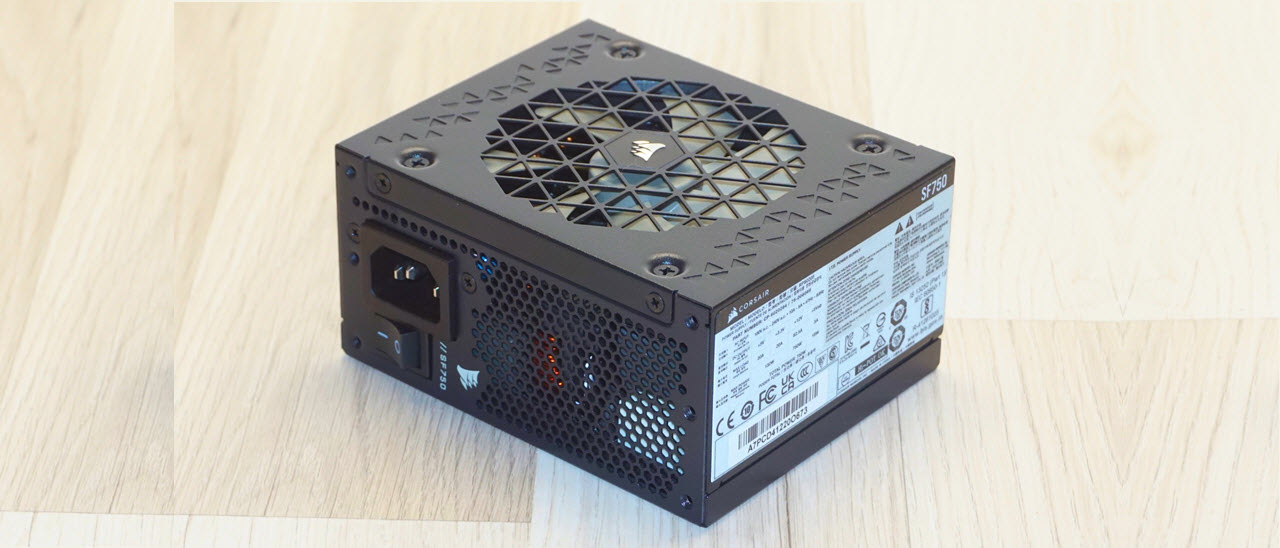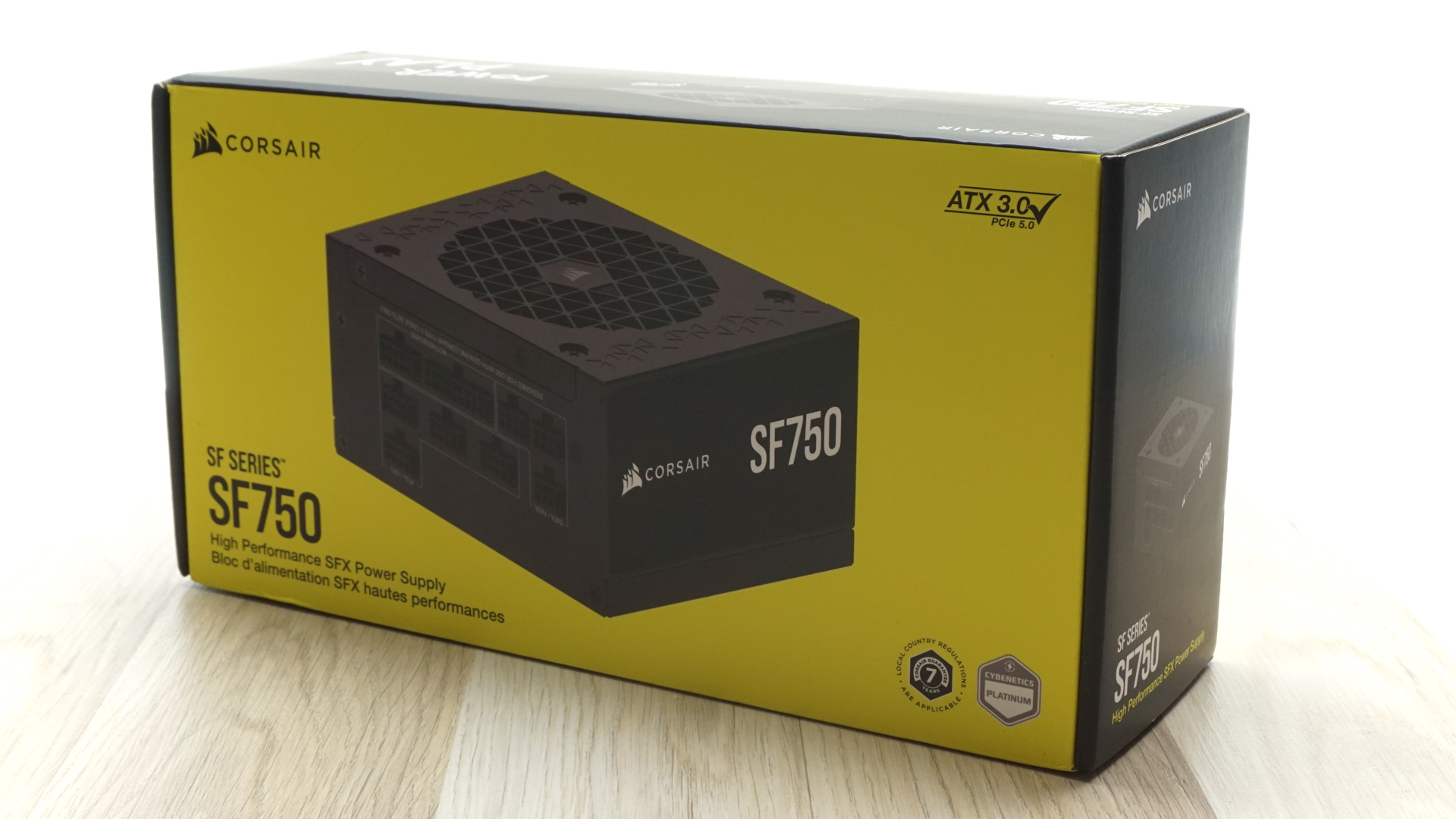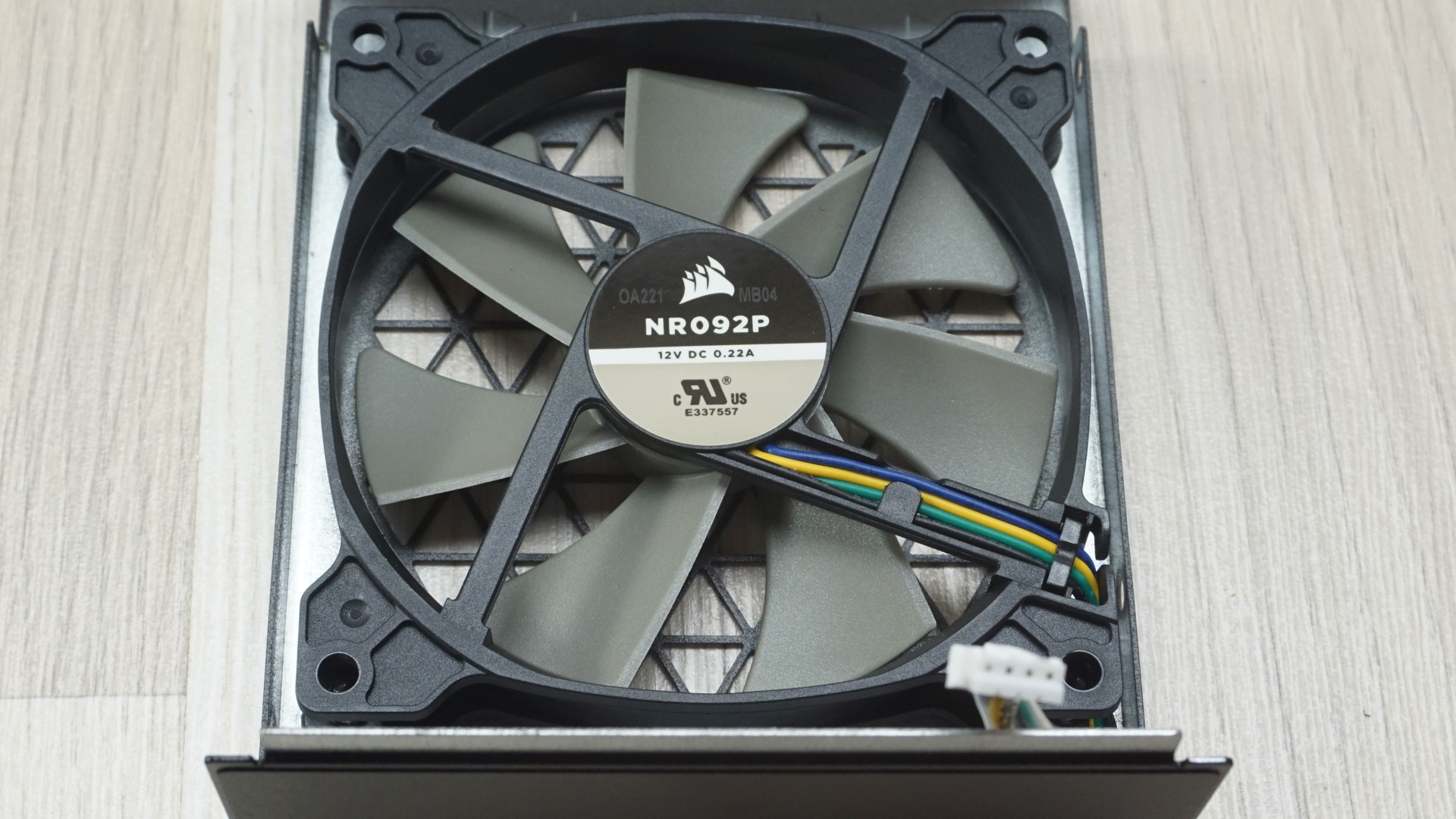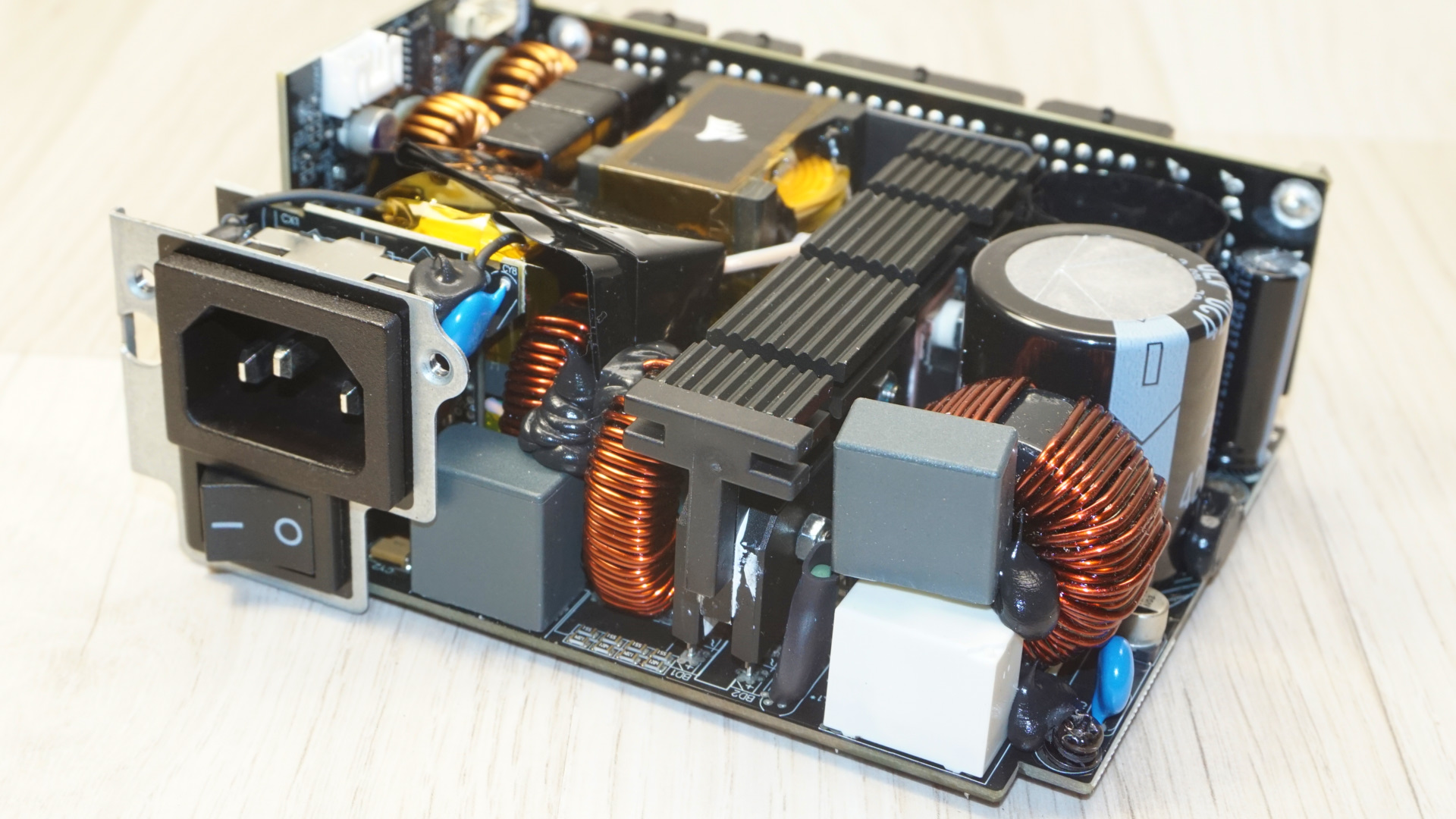Tom's Hardware Verdict
The Corsair SF750 SFX PSU delivers exceptional performance with high efficiency and precise voltage regulation, making it an excellent choice for compact, high-performance systems. While the price is steep, it's justified by the unit’s feature set and superior build quality, making it a standout in the SFX PSU market.
Pros
- +
Excellent voltage regulation
- +
High efficiency, even at low loads
- +
Superior build quality
- +
Effective ripple suppression
- +
ATX 3.1 compliance with 12V-2x6 support
Cons
- -
High retail price
- -
Limited cable length for ATX cases
Why you can trust Tom's Hardware
Corsair, a leading brand in the PC hardware industry, has a strong reputation for producing high-quality components, particularly in the power supply unit (PSU) sector. The Corsair SF750 SFX PSU is designed to comply with the latest ATX 3.1 standard, making it a cutting-edge solution for compact and powerful systems. A candidate for our list of the best power supplies, this 750W PSU is packed with premium features, including individually sleeved cables and a 12V-2x6 connector, ensuring compatibility with the latest high-performance graphics cards. With an 80Plus Platinum certification, the SF750 positions itself at the higher end of the market, catering to both enthusiasts and professionals who demand top-tier performance and reliability and are willing to pay a premium (currently $179).
We should also note that even though the box of the unit we received indicates that this is an ATX 3.0 compliant unit, Corsair assured us that the ATX 3.1 unit is identical and they merely did not change the box in time. It is reasonable that the company will only be changing the badge on the box itself as the ATX 3.1 standard requirements are actually slacker than ATX 3.0 requirements, meaning that a unit that passes ATX 3.0 testing will automatically pass ATX 3.1 testing as well – the only tangible difference is the 12V-2x6 connector, which merely has shorter sense pins than the 12VHPWR connector on the unit’s side, which also is inconsequential in this case as Corsair is using their own types of connectors on this particular PSU.
Specifications and Design
| RAIL | +3.3V | +5V | +12V | +5Vsb | -12V |
| MAX OUTPUT | 20A | 20A | 62.5A | 3A | 0A |
| Row 2 - Cell 0 | 130W | 130W | 750W | 15W | 0W |
| TOTAL | 750W | 750W | 750W | 750W | 750W |
| AC INPUT | 100 - 240 VAC, 50 - 60 Hz | 100 - 240 VAC, 50 - 60 Hz | 100 - 240 VAC, 50 - 60 Hz | 100 - 240 VAC, 50 - 60 Hz | 100 - 240 VAC, 50 - 60 Hz |
| MSRP | $180 | Row 5 - Cell 2 | Row 5 - Cell 3 | Row 5 - Cell 4 | Row 5 - Cell 5 |
In the Box
The Corsair SF750 SFX PSU arrives in a robust cardboard box that demonstrates Corsair's distinctive black and yellow color scheme. The PSU itself is securely protected within a nylon pouch and foam inserts, ensuring safe transit. The bundle is well-rounded, including mounting screws, an AC power cable, cable straps, and a few cable ties. Additionally, Corsair includes an SFX-to-ATX case adapter, although users should note that the relatively short cables may pose a challenge when installed in larger ATX cases.
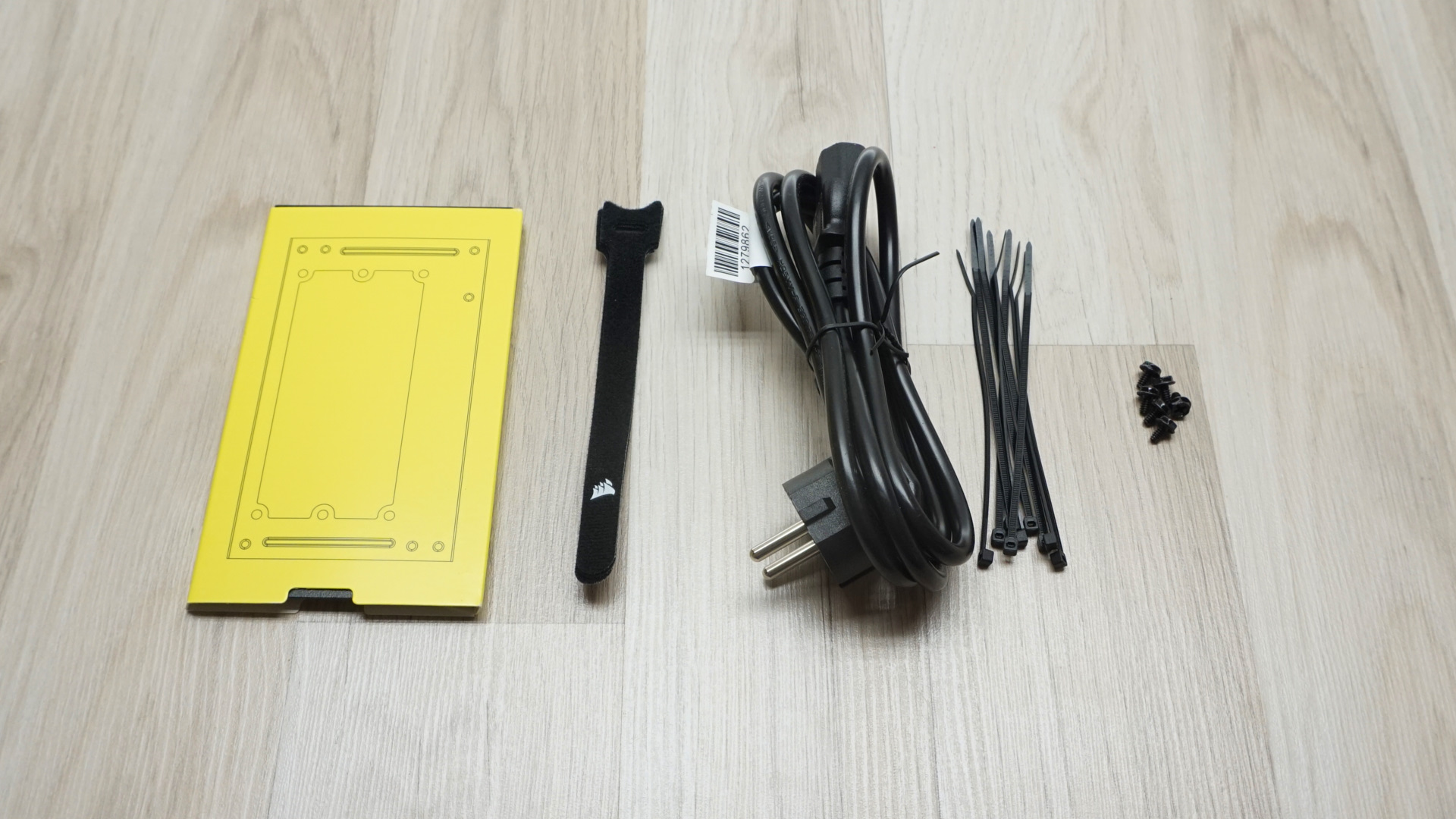
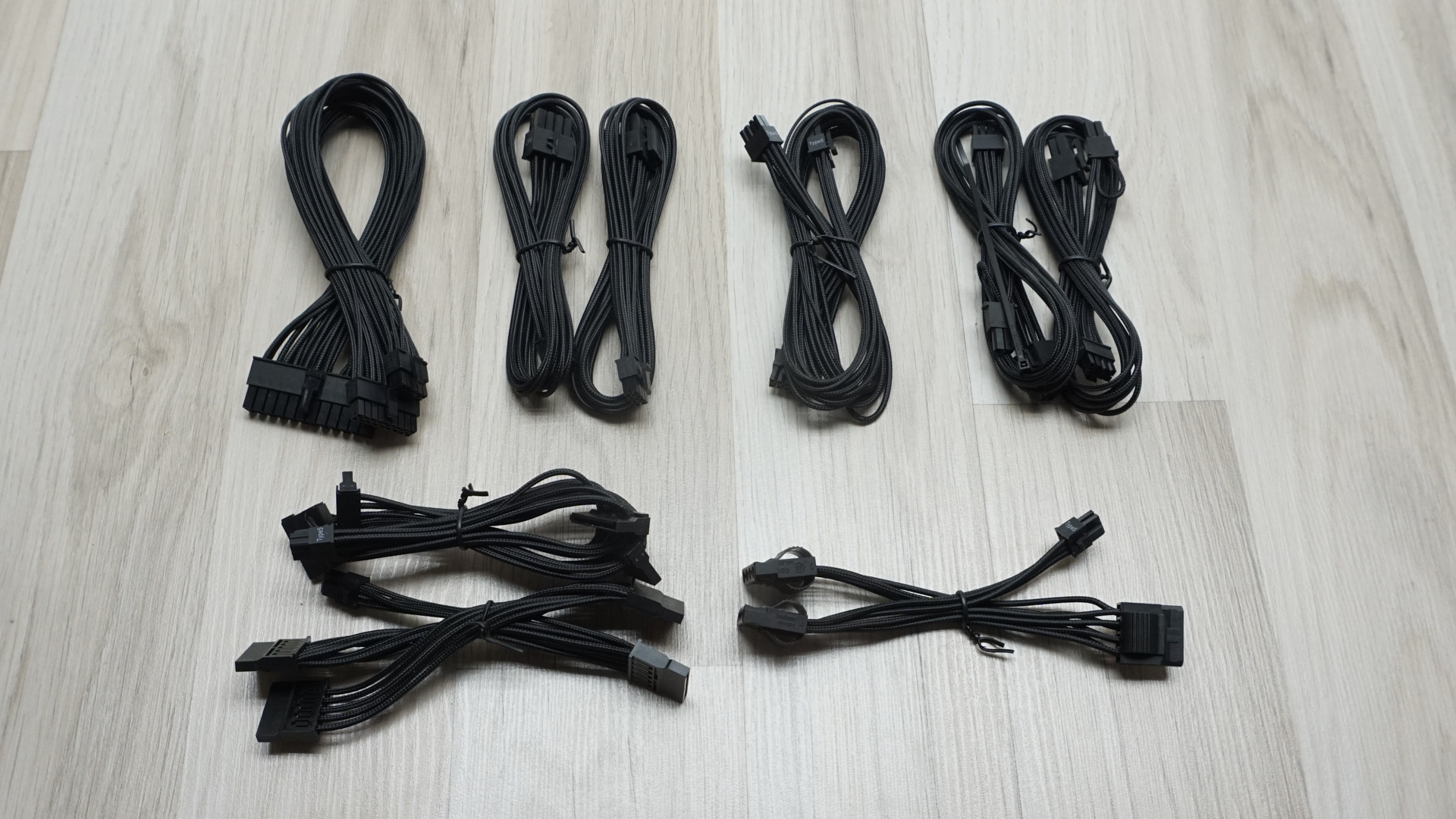
The SF750 features all-black, individually sleeved cables with black connectors, enhancing the overall aesthetics and making it easier to maintain a clean build. The inclusion of a 12V-2x6 connector alongside two 6+2 pin PCI Express connectors ensures compatibility with modern GPUs without sacrificing cable management.
| Connector type | Hardwired | Modular |
|---|---|---|
| ATX 24 Pin | - | 1 |
| EPS 4+4 Pin | - | 2 |
| EPS 8 Pin | - | - |
| PCI-E 5.0 | - | 1 |
| PCI-E 8 Pin | - | 2 |
| SATA | - | 8 |
| Molex | - | 3 |
| Floppy | - | - |
External Appearance
The Corsair SF750 SFX PSU is housed in a compact chassis measuring 100 mm in length, adhering precisely to SFX specifications. This small size is ideal for compact builds, with Corsair’s engineering trying to compromise on cooling and functionality as little as possible. The PSU’s matte black finish gives it a sleek and elegant appearance, while the chassis features a geometric pattern of punched triangles, adding a subtle yet distinctive aesthetic touch. The fan guard, integrated into the chassis, continues this geometric theme, complementing the overall design.
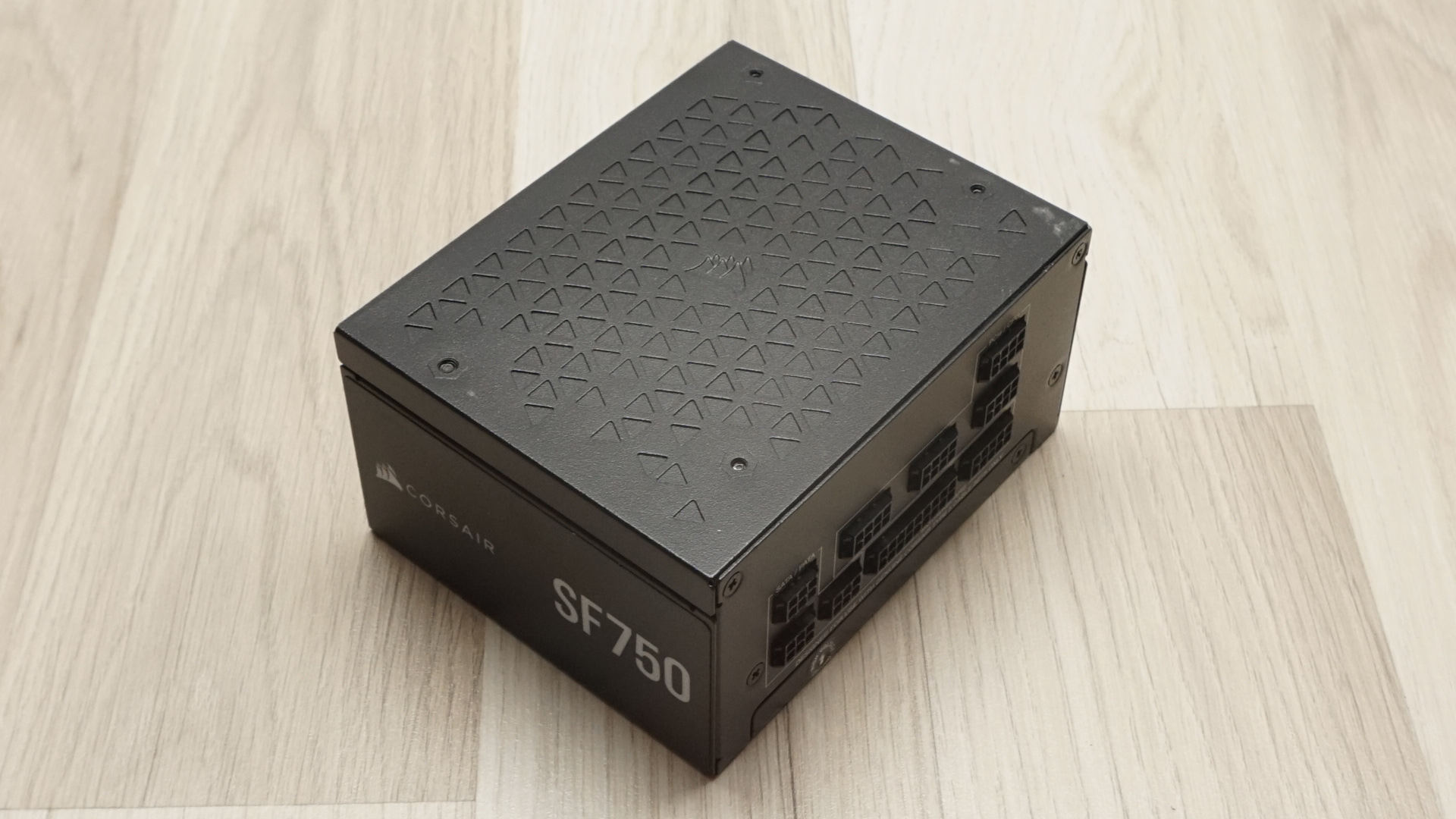
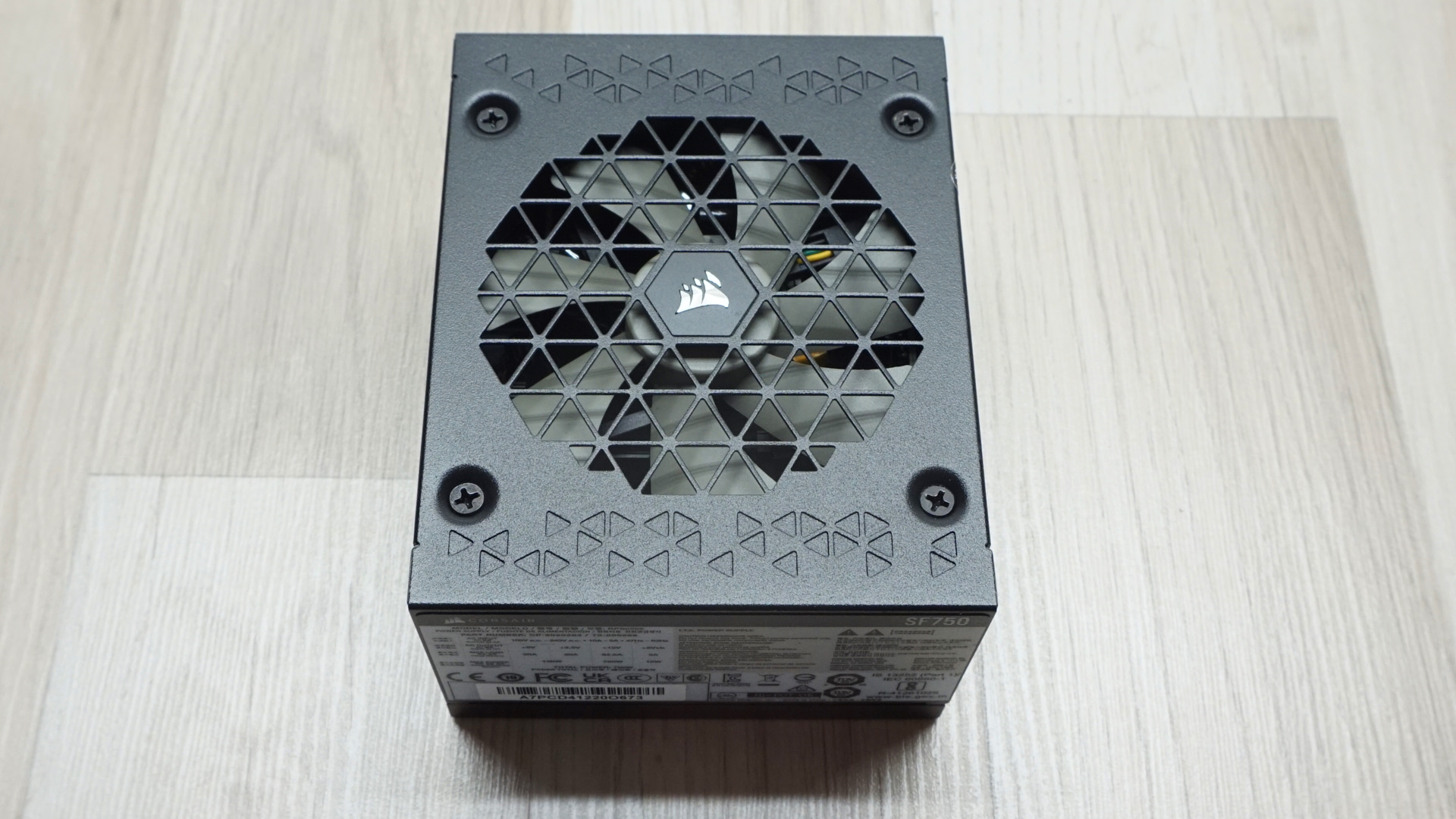
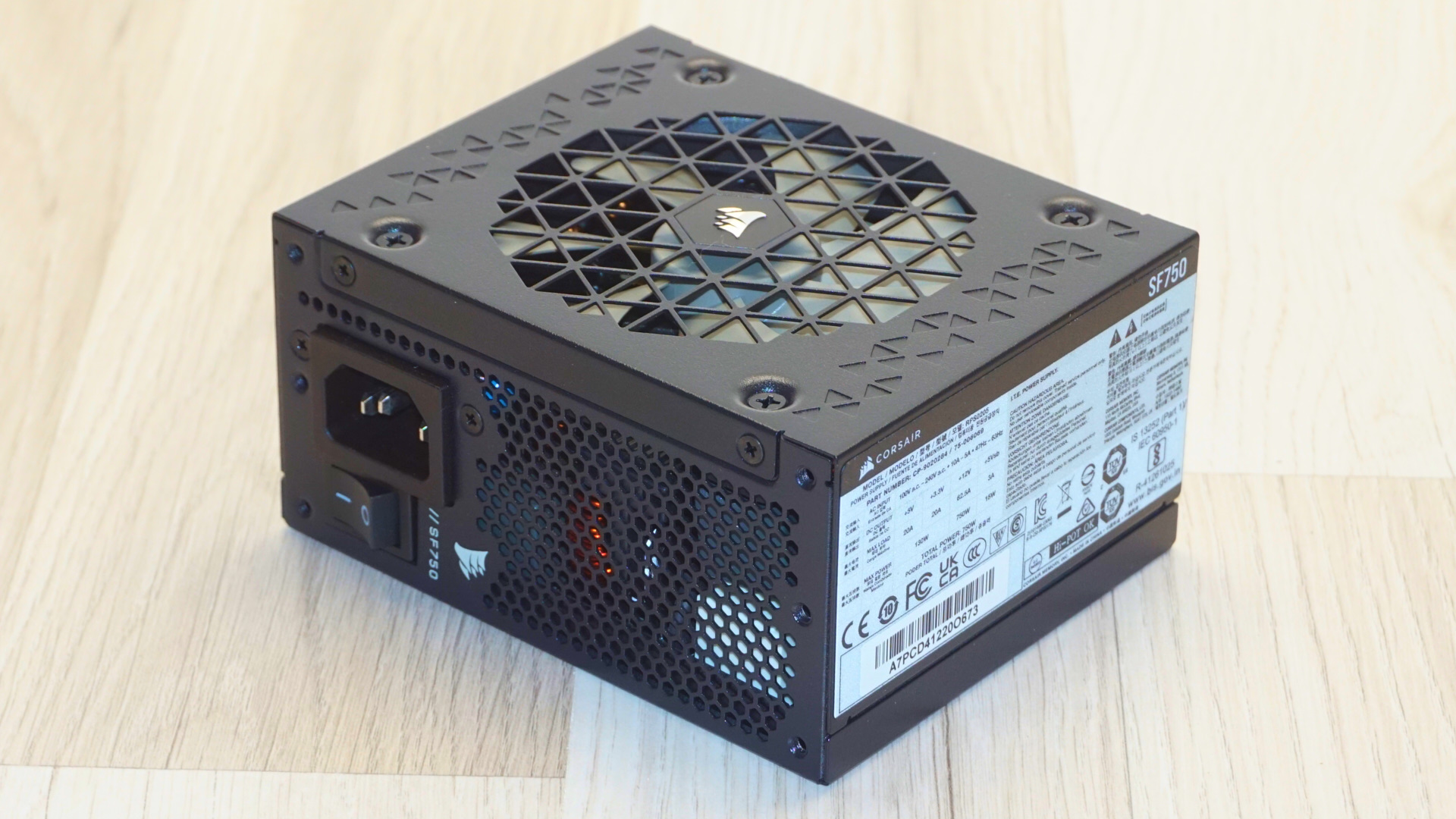
The rear of the PSU includes the standard on/off switch and AC power receptacle. There also is a very small etching of the unit’s model designation. The front is dedicated to modular cable connectors, with a subtle legend indicating their functions. The cable connectors are smaller and more unique than those typically found in other PSUs, with Corsair replacing the 12V-2x6 connector on the PSU’s side as well. The left side features a decorative sticker, while the right side displays a label with the electrical specifications and certifications.
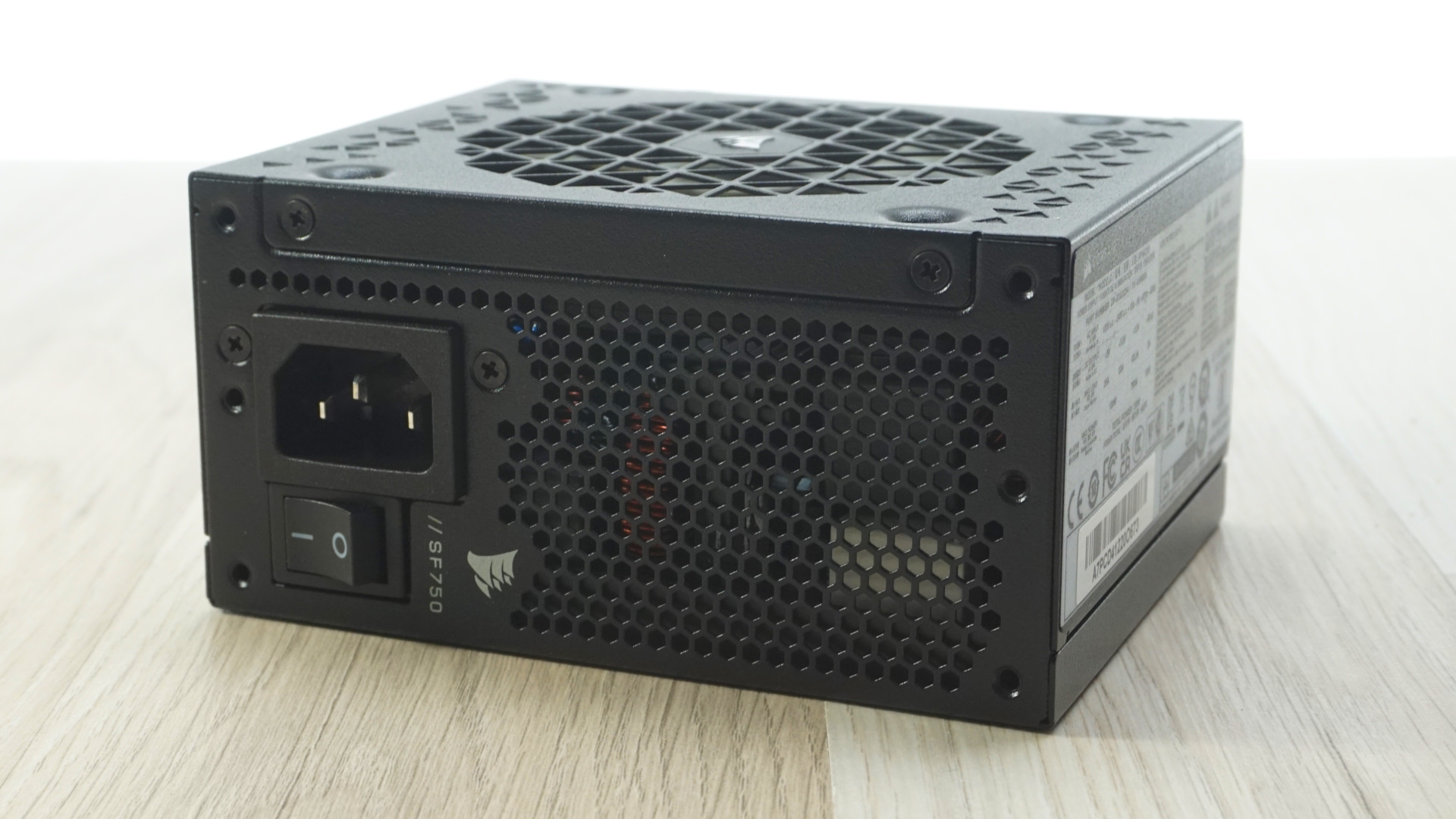
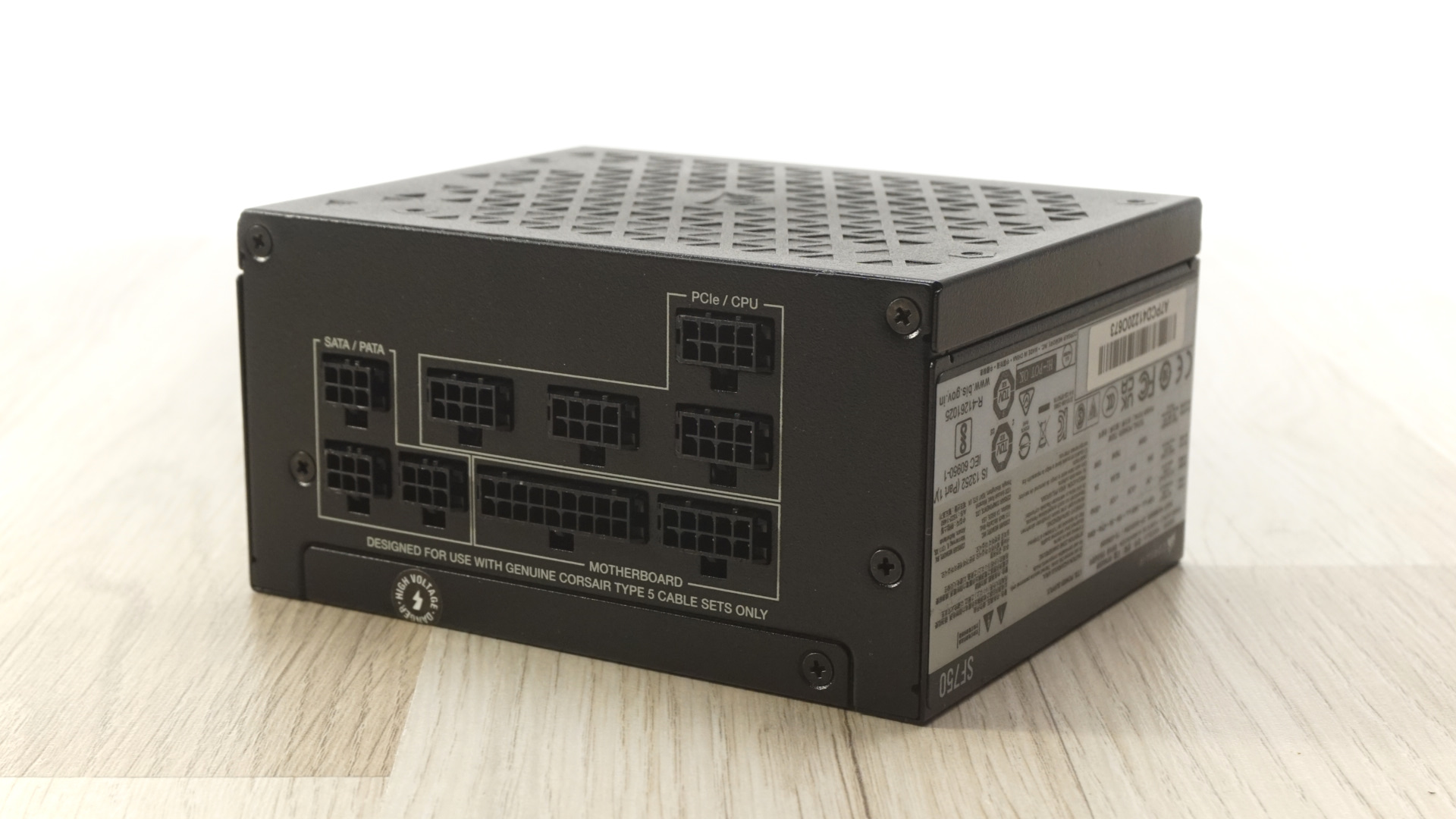
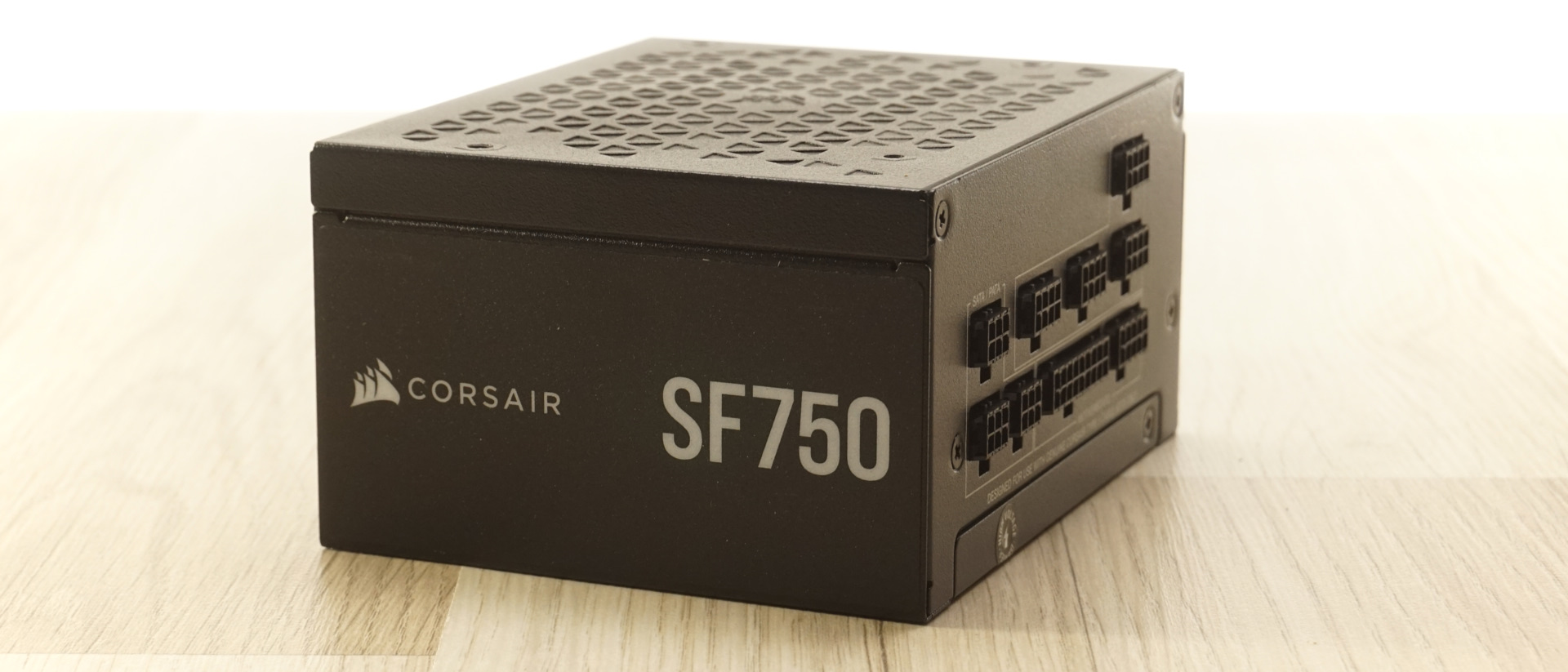
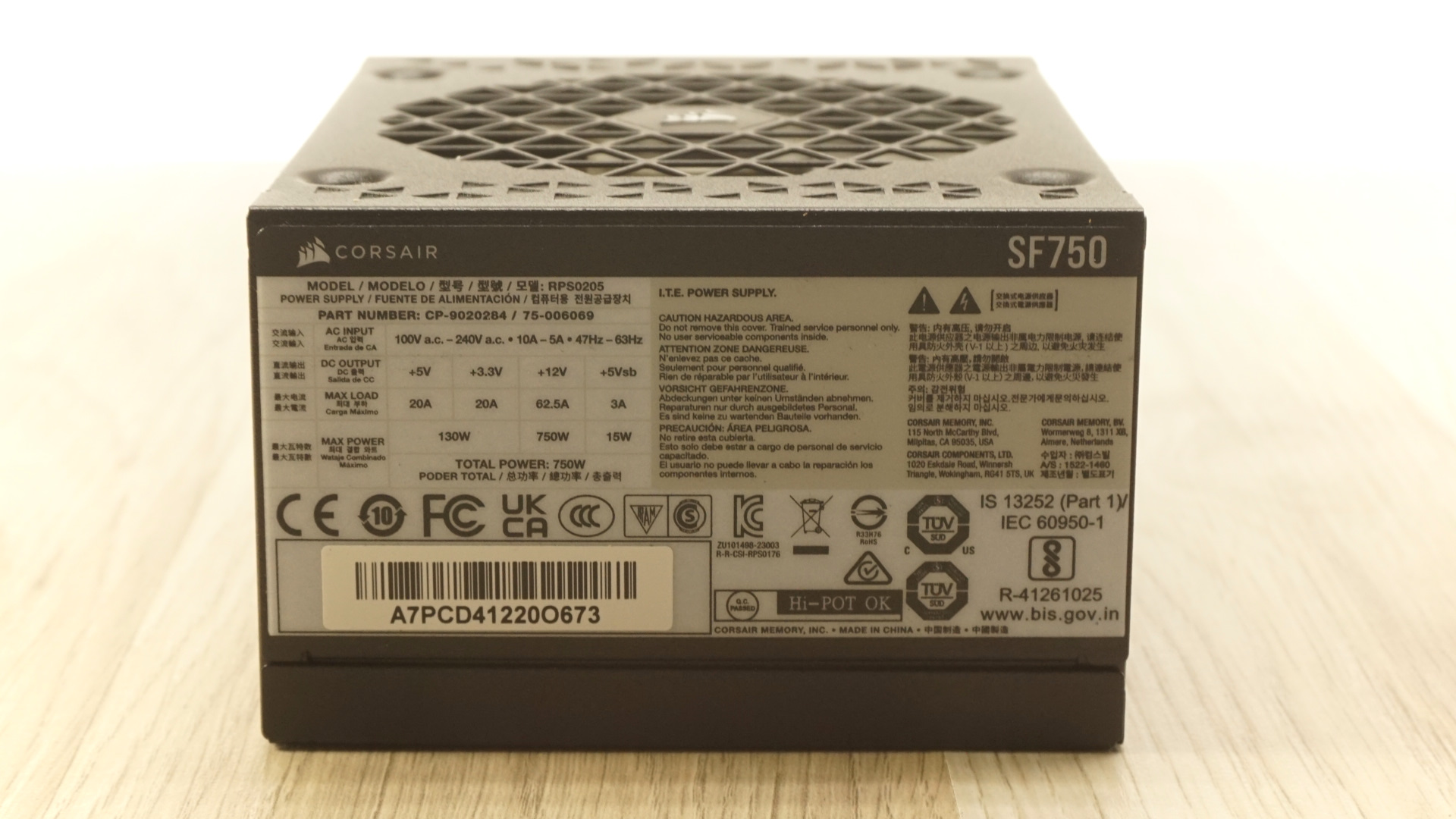
Internal Design
The Corsair SF750 SFX PSU is equipped with a 92mm fan featuring a high-performance fluid dynamic bearing. While specific technical details about this fan are limited, it is known for its quiet operation and effective cooling, tailored to the compact size of the unit. The fan's design is optimized to maintain low noise levels even under high load, which is crucial for SFX power supplies.
Get Tom's Hardware's best news and in-depth reviews, straight to your inbox.
The SF750 is based on a platform by Great Wall, a nowadays well-established Chinese OEM known for its quality and innovation in the power supply market. Great Wall's platforms are often used in high-end power supplies over the past decade, demonstrating expertise in creating reliable, compact units.
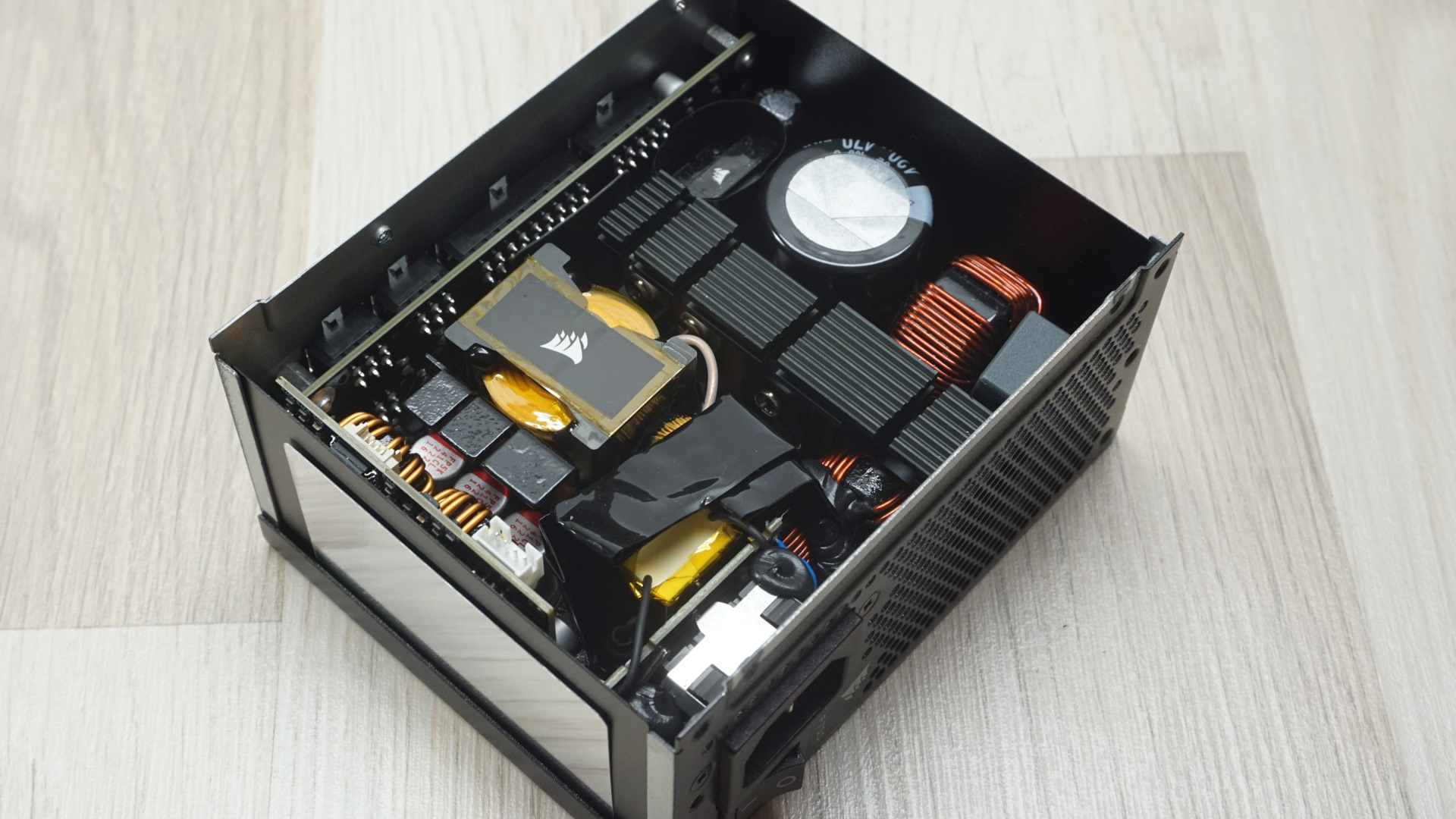
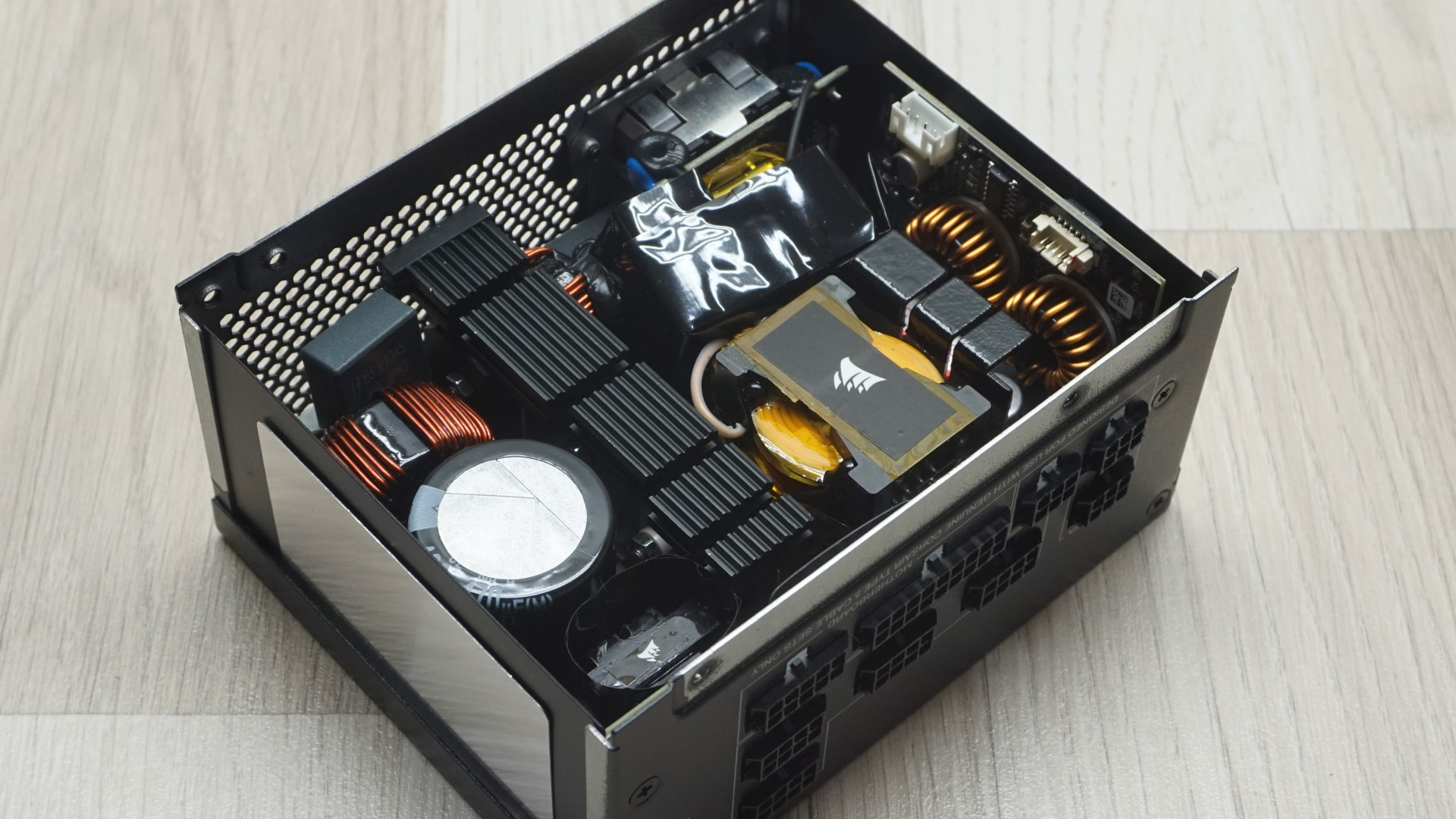
The primary inversion stage employs two high-efficiency MOSFETs (Rohm R6035VNX3) configured in a resonant LLC topology. These are also found on the same heatsink as the input bridges and APFC components. There is another smaller heatsink but it is meant to cool the transformer itself. The secondary stage uses four Infineon 014N04LS6 MOSFETs in a synchronous rectification formation to generate the 12V rail, with DC-to-DC converters handling the 3.3V and 5V lines. The secondary side capacitors are a mix of Rubycon and Nichicon products, both highly reputable Japanese manufacturers.
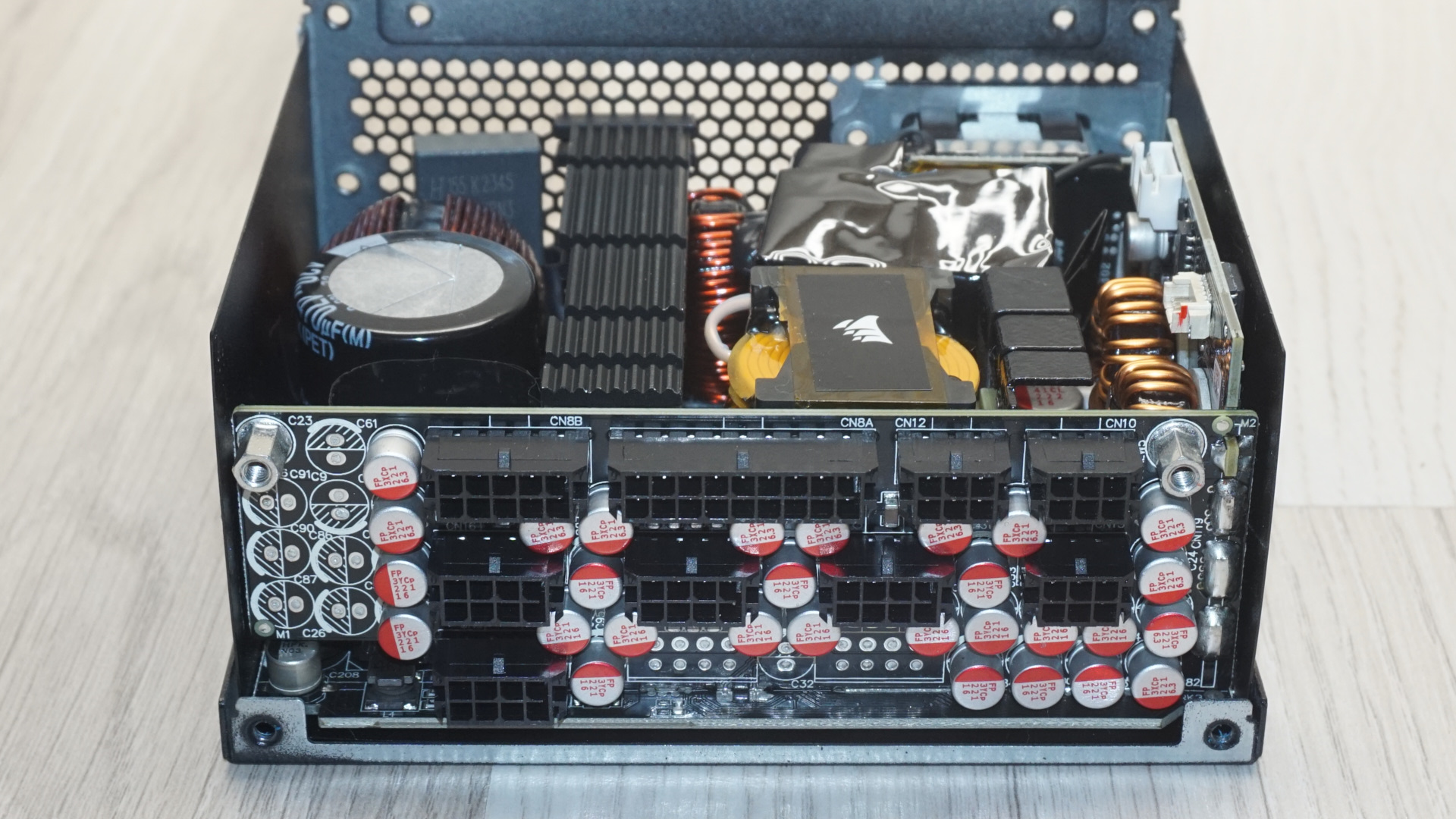
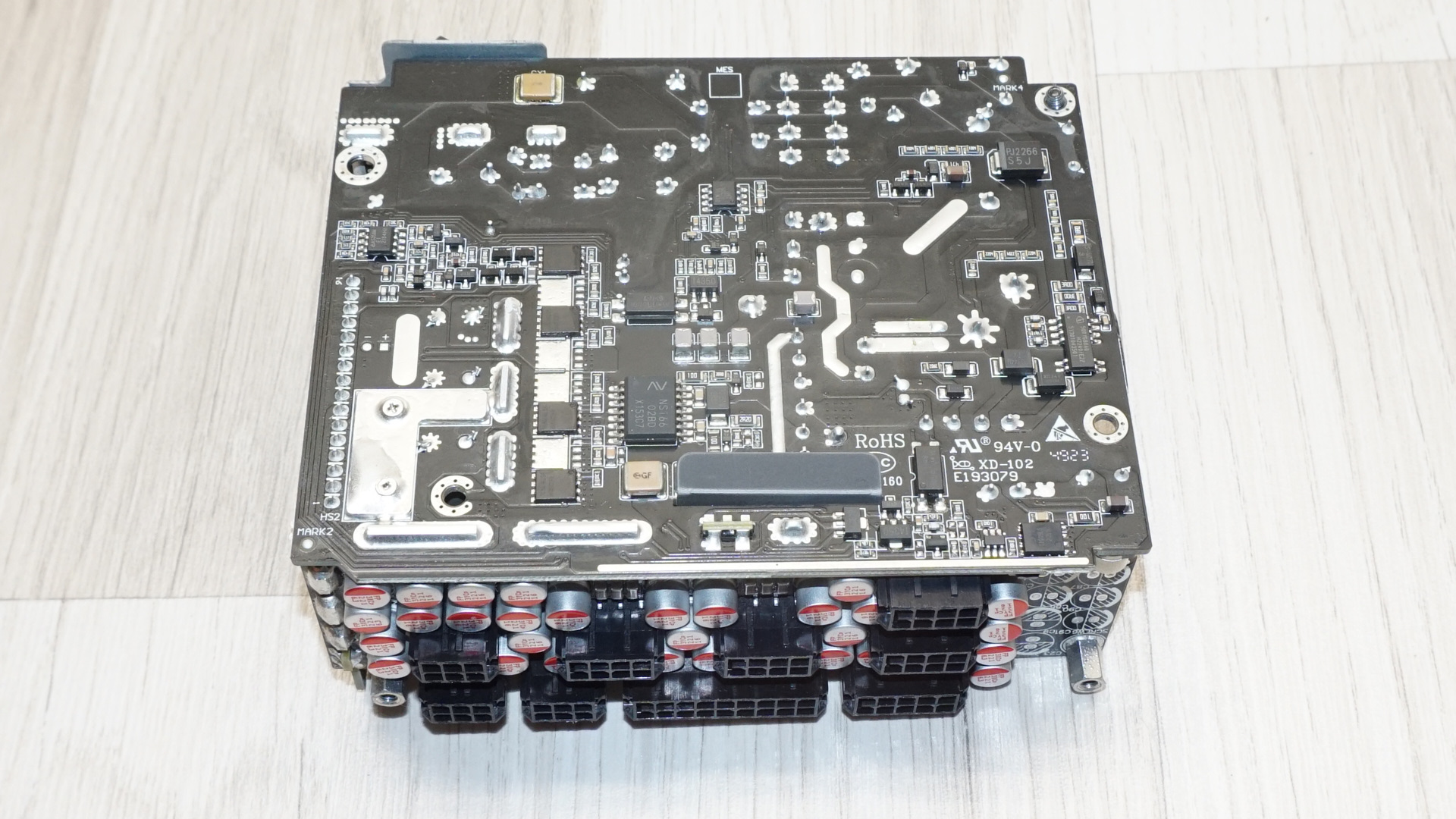
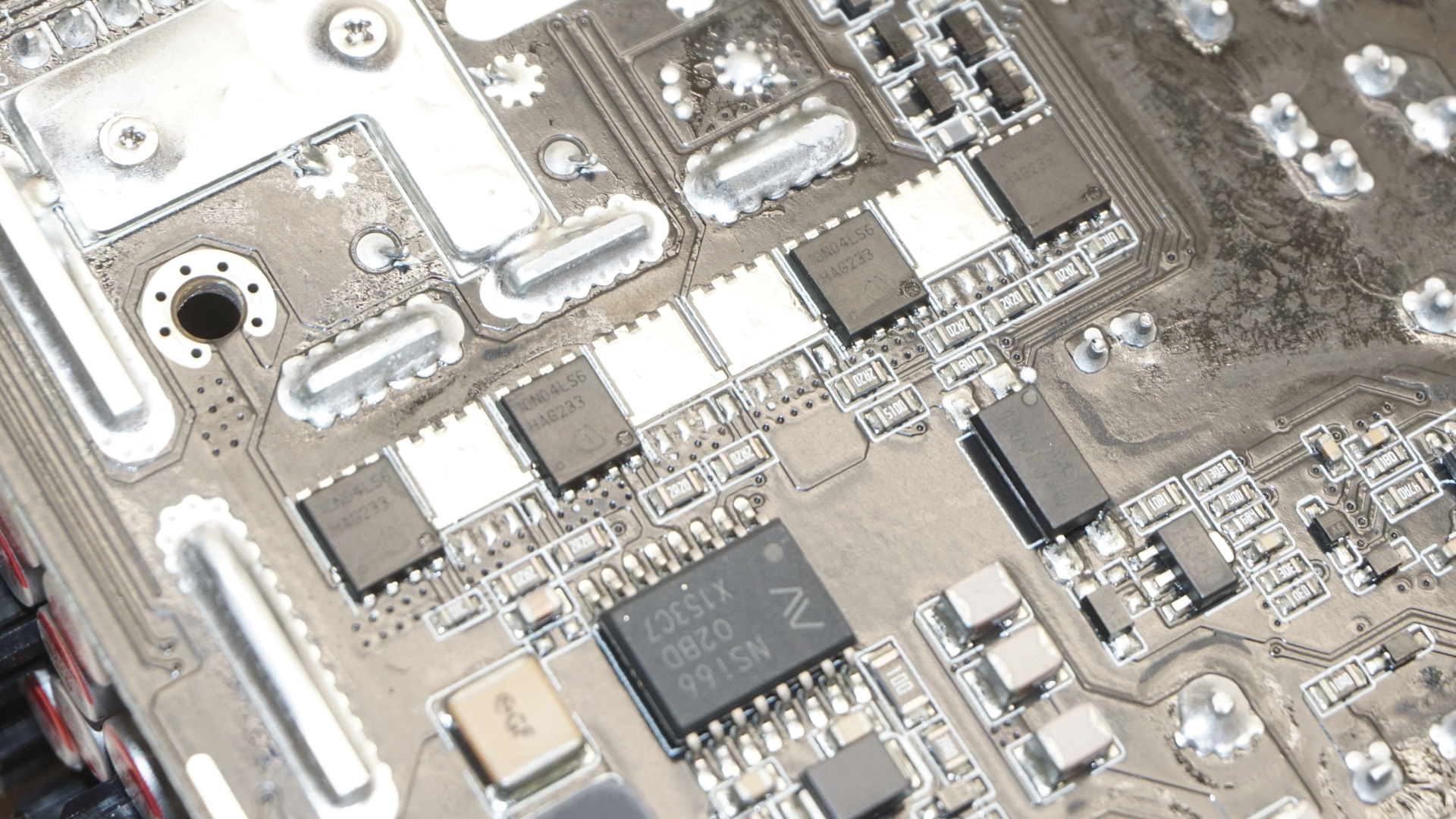
The primary inversion stage of the RM850x Shift utilizes two ST Microelectronics 33N60M2 MOSFETs arranged in a half-bridge LLC configuration. These components are positioned on a large heatsink adjacent to the main transformer. The secondary stage features six Onsemi NTMFS5C430N MOSFETs located on the underside of the PCB, generating the primary 12V line using a synchronous rectification topology. Small nickel heatsinks can be seen at the upper side of the PCB, assisting in their cooling. The 3.3V and 5V rails are produced through DC-to-DC conversion on a vertical daughterboard. The capacitors on the secondary side are a mix of high-quality electrolytic and polymer types from Nippon Chemi-Con and Nichicon, reputable Japanese manufacturers known for their reliability and performance in premium PC PSUs.
Cold Test Results
Cold Test Results (25°C Ambient)
For the testing of PSUs, we are using high precision electronic loads with a maximum power draw of 2700 Watts, a Rigol DS5042M 40 MHz oscilloscope, an Extech 380803 power analyzer, two high precision UNI-T UT-325 digital thermometers, an Extech HD600 SPL meter, a self-designed hotbox and various other bits and parts.
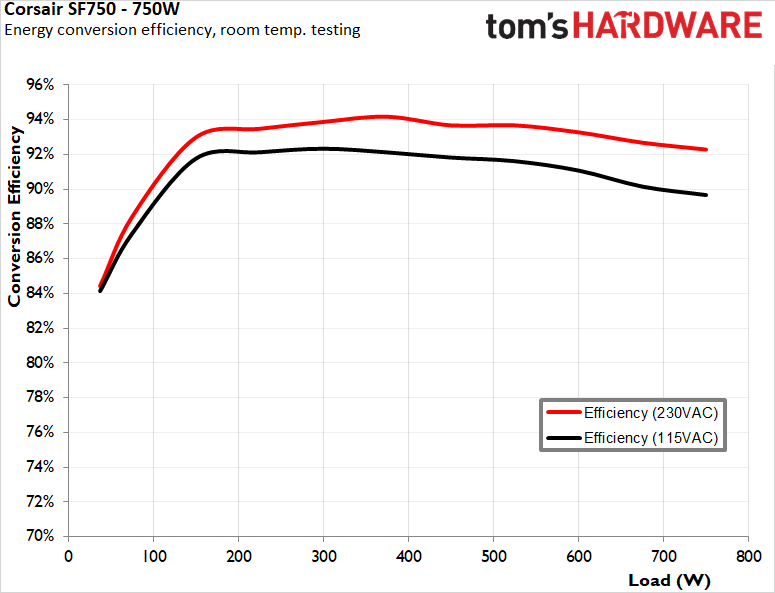
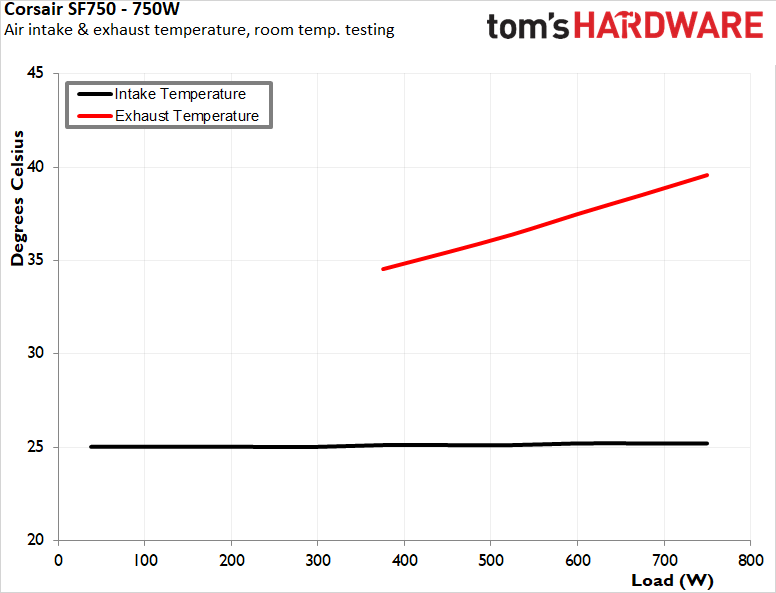
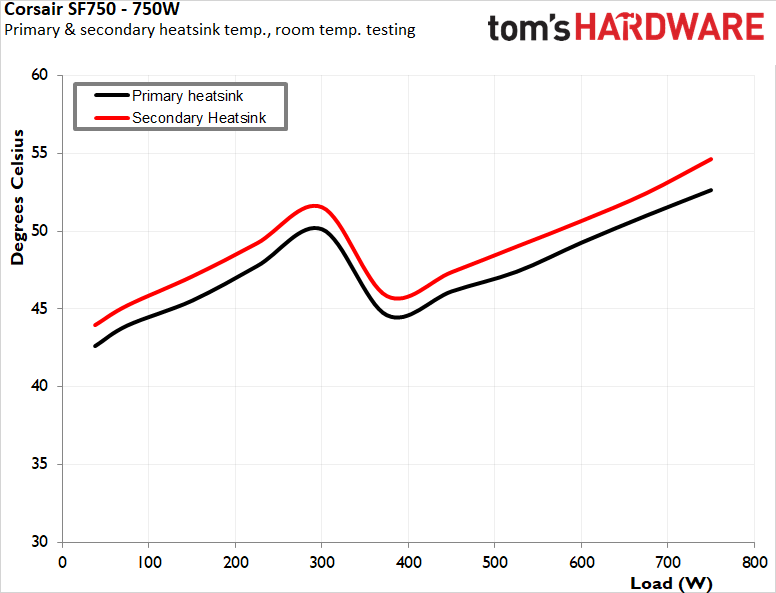
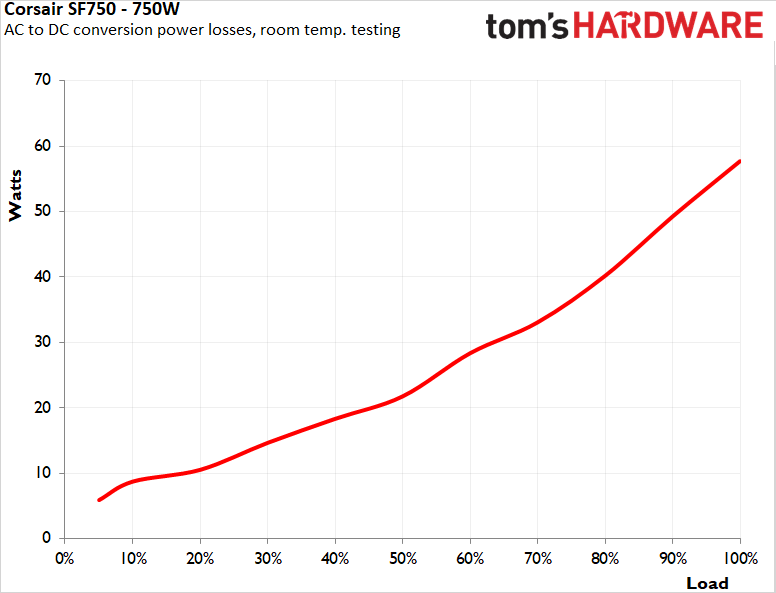
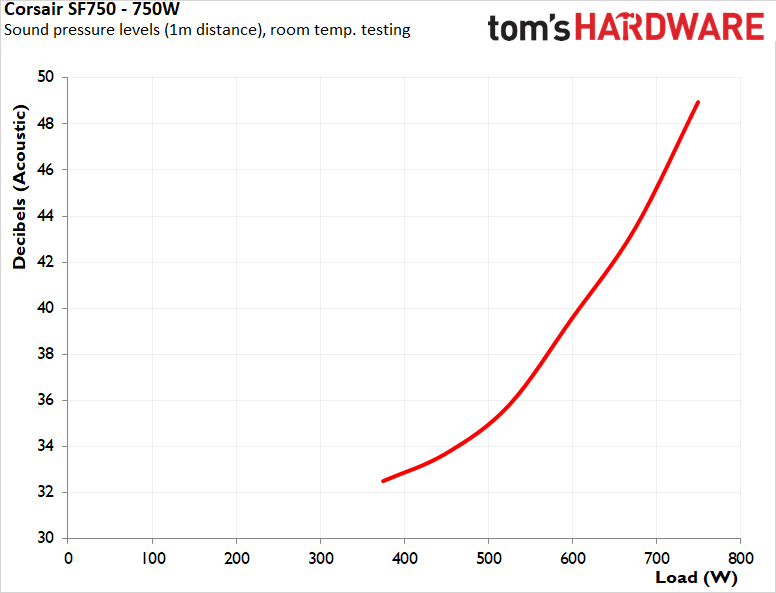
During cold testing, the Corsair SF750 SFX PSU comfortably meets the 80Plus Platinum certification requirements across different input voltages. With a 115 VAC input, the PSU achieves an average nominal load efficiency of 91.4%, which further improves to 93.4% when using a 230 VAC input. The efficiency peaks at around 50% load, aligning with typical PSU behavior. Although there is a 2% efficiency drop when using a 115 VAC input, the SF750 still exceeds the certification requirements. Its efficiency is outstanding, even at very low loads, demonstrating superior performance uncommon in PSUs of this size.
The fan in the Corsair SF750 starts spinning at around 50% capacity, an impressive feat for a unit this small and dense. It is silent once it starts but its speed increases very quickly, making it clearly audible under high loads. However, even at full load, the fan does not reach its maximum speed when the unit is operating at room temperature. The internal temperatures of the unit remain fairly low at all times.
Hot Test Results
Hot Test Results (~45°C Ambient)
During hot testing, the Corsair SF750 SFX PSU experiences a slight decrease in efficiency under heavy loads, with efficiency figures dropping to 90.9% at 115 VAC and 92.8% at 230 VAC, compared to 91.4% and 93.4% during cold testing. An efficiency degradation of less than 1% is minimal and indicates that the unit handles high ambient temperatures well, without practically any thermal stress on its components.
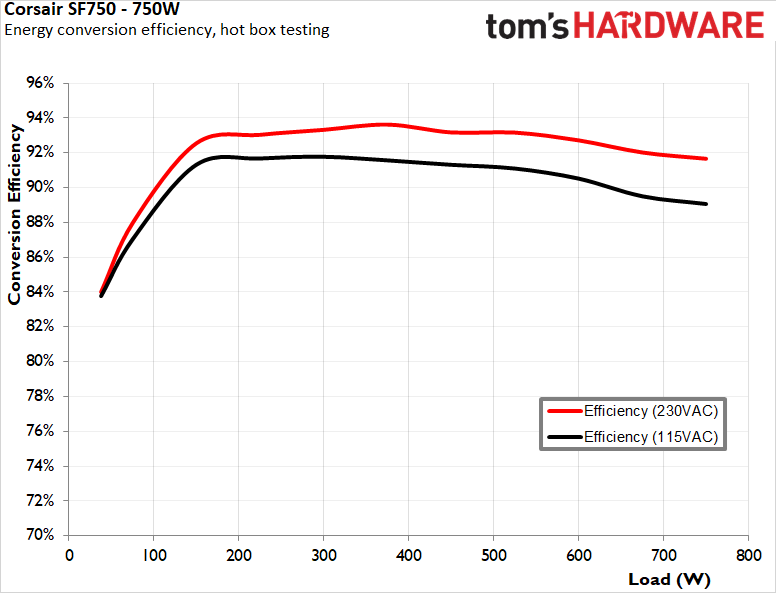
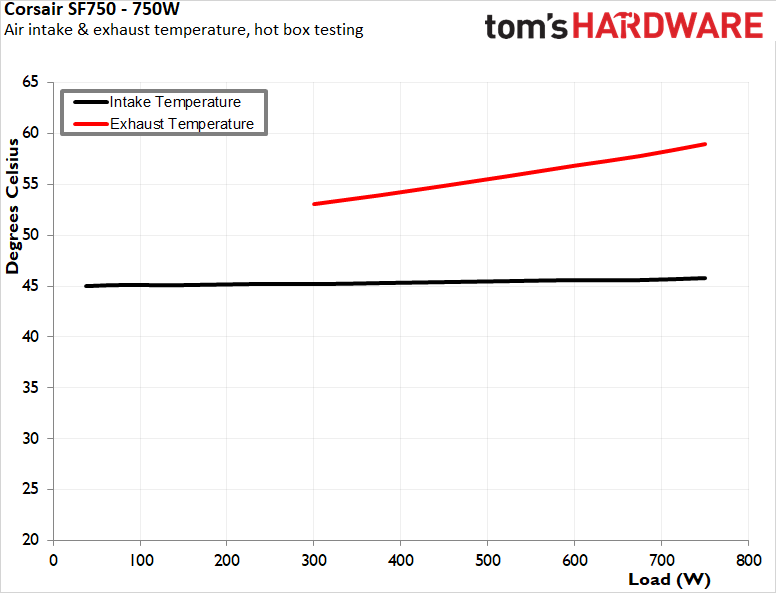
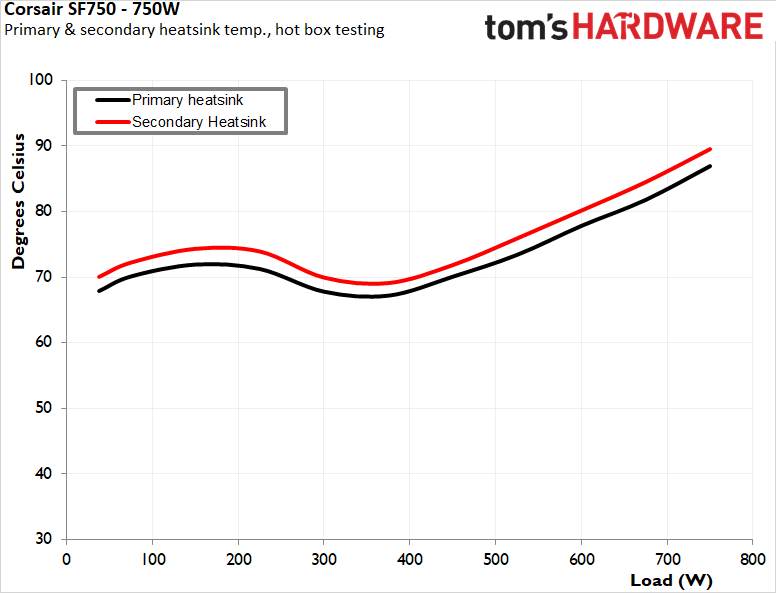
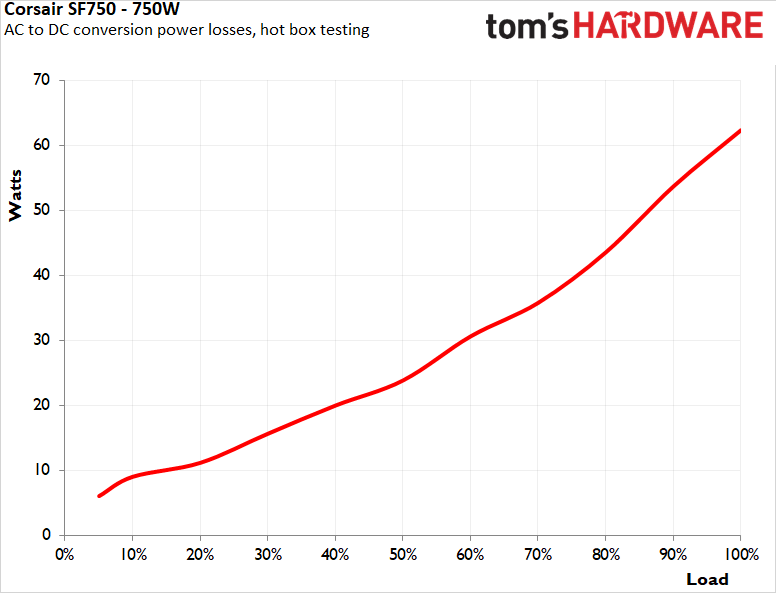
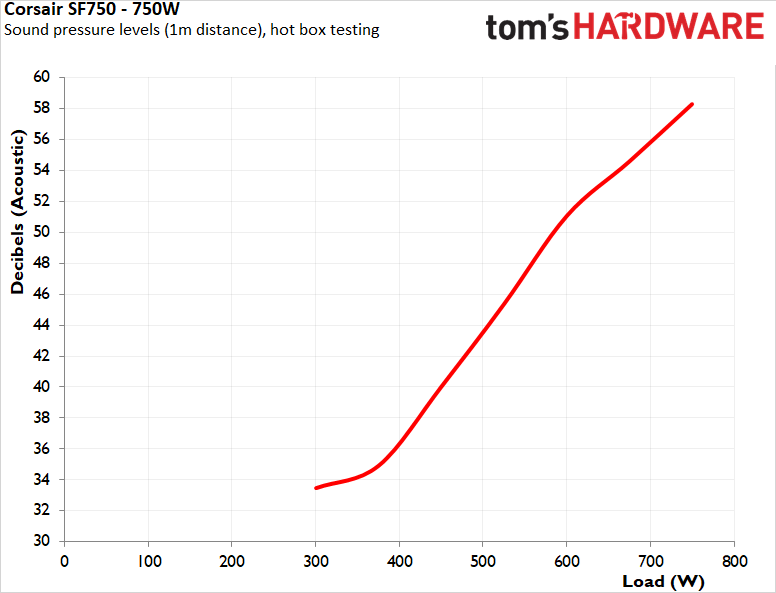
In these hotter ambient conditions, the fan of the SF750 activates slightly sooner than during cold testing, starting at around 40% capacity and ramping up more quickly as the load increases. Again, even at full load, the fan does not reach its maximum speed but does become very loud if a heavy load is sustained for a prolonged period of time. The internal temperatures of the unit are remarkably low for its size.
PSU Quality and Bottom Line
Power Supply Quality
The Corsair SF750 SFX PSU delivers exceptional electrical performance, with several features that distinguish it in its class. The unit exhibits outstanding voltage regulation, maintaining the 5V and 3.3V rails within a mere 0.5% deviation, which is impressive for any power supply. The 12V rail also shows strong regulation at 0.7%, reflecting a well-rounded design that does not compromise on the minor voltage lines, which are often overlooked in favor of the 12V line by many manufacturers.
| Load (Watts) | 151.4 W | Row 0 - Cell 2 | 378.07 W | Row 0 - Cell 4 | 565.23 W | Row 0 - Cell 6 | 752.37 W | Row 0 - Cell 8 |
| Load (Percent) | 20.29% | Row 1 - Cell 2 | 50.41% | Row 1 - Cell 4 | 75.36% | Row 1 - Cell 6 | 100.32% | Row 1 - Cell 8 |
| Row 2 - Cell 0 | Amperes | Volts | Amperes | Volts | Amperes | Volts | Amperes | Volts |
| 3.3 V | 1.80 | 3.34 | 4.50 | 3.34 | 6.75 | 3.33 | 9.00 | 3.32 |
| 5 V | 1.80 | 5.02 | 4.50 | 5.01 | 6.75 | 5.01 | 9.00 | 5.00 |
| 12 V | 11.25 | 12.12 | 28.14 | 12.10 | 42.2 | 12.06 | 56.27 | 12.04 |
| Line | Regulation (20% to 100% load) | Voltage Ripple (mV) | Header Cell - Column 3 | Header Cell - Column 4 | Header Cell - Column 5 | Header Cell - Column 6 | Header Cell - Column 7 |
|---|---|---|---|---|---|---|---|
| Row 0 - Cell 0 | Row 0 - Cell 1 | 20% Load | 50% Load | 75% Load | 100% Load | CL1 12V | CL2 3.3V + 5V |
| 3.3V | 0.60% | 16 | 12 | 16 | 20 | 12 | 16 |
| 5V | 0.50% | 14 | 10 | 12 | 18 | 12 | 16 |
| 12V | 0.70% | 18 | 16 | 28 | 42 | 26 | 16 |
In terms of ripple suppression, the SF750 does exceptionally well for a unit of its size, with measured maximum ripple values of 42 mV on the 12V line, 18 mV on the 5V line, and 20 mV on the 3.3V line. These values are well within industry standards, ensuring clean power delivery to your components. We typically see a little better figures in top-tier ATX units but these are exceptional results considering the limited space of the SFX chassis.
During our thorough assessment, we evaluate the essential protection features of every power supply unit we review, including Over Current Protection (OCP), Over Voltage Protection (OVP), Over Power Protection (OPP), and Short Circuit Protection (SCP). The Corsair SF750 PSU successfully passed all critical protection tests without issue.
The OCP settings for the 3.3V and 5V rails are set to activate at 140%, significantly higher than expected but it can be attributed to the unit’s relatively-high 130 Watt combined output. The 12V rail's OCP is set to activate at 146%, a very high setting even for an ATX 3.0 compliant unit, suggesting that the SF750 is probably sharing the same design as the SF850.
Bottom Line
The Corsair SF750 SFX PSU stands out as a top-tier power supply unit that combines exceptional performance, reliability, and premium build quality in a compact form factor. Designed to meet the latest ATX 3.1 standard (at least electrically), this PSU is equipped with high-end features typically found in larger, more expensive units, making it an ideal choice for enthusiasts and professionals building high-performance small form factor (SFF) systems. Corsair's decision to use top-tier components, including Rubycon and Nichicon capacitors and top-tier Infineon MOSFETs, underscores both the performance and quality of the SF750. The robust construction and careful selection of components not only enhance performance overall but also contribute to the unit's long-term reliability. Backed by a 7-year warranty, the SF750 offers peace of mind, ensuring users that they are investing in a product built to last.
One of the most notable aspects of the Corsair SF750 is its outstanding electrical performance. The unit demonstrates exceptional voltage regulation, maintaining deviations well below 1% across all rails, which is remarkable for any PSU, especially one of this size. The 12V rail regulation at 0.7% is remarkable but the tighter regulation of the minor rails is even more impressive. Additionally, the ripple suppression is top-notch, with maximum ripple values of 42 mV on the 12V rail and 18 mV / 20 mV on the 5V and 3.3V rails respectively, ensuring clean power delivery, critical for the longevity and performance of sensitive PC components.
During both cold and hot testing, the SF750 maintained high efficiency levels, comfortably meeting and exceeding the 80Plus Platinum certification requirements. With average nominal load efficiencies of 91.4% at 115 VAC and 93.4% at 230 VAC during cold testing, and only minimal efficiency drop in hotter conditions, the SF750 showcases excellent thermal management and energy efficiency. The unit's small fan, though audible under heavy loads, is well-controlled and contributes to maintaining low internal temperatures without becoming overly intrusive. Despite its very high power density and limiting low-profile 92 mm fan, there are zero signs of thermal stress under any conditions.
However, this level of quality and performance comes at a cost. The SF750's retail price of around $180 is steep, but it is not unexpected given its SFX proportions, electrical compliance with the ATX 3.1 standard, and the premium features it offers. For users who demand the best in a compact form factor and are willing to invest in top-tier performance, the Corsair SF750 SFX PSU is an excellent choice that justifies its price with exceptional build quality, efficiency, and reliability.
MORE: Best Power Supplies
MORE: How We Test Power Supplies
MORE: All Power Supply Content

Dr. E. Fylladitakis has been passionate about PCs since the 8088 era, beginning his PC gaming journey with classics like Metal Mutant and Battle Chess. Not long after, he built his first PC, a 486, and has been an enthusiast ever since. In the early 2000’s, he delved deeply into overclocking Duron and Pentium 4 processors, liquid cooling, and phase-change cooling technologies. While he has an extensive and broad engineering education, Dr. Fylladitakis specializes in electrical and energy engineering, with numerous articles published in scientific journals, some contributing to novel cooling technologies and power electronics. He has been a hardware reviewer at AnandTech for nearly a decade. Outside of his professional pursuits, he enjoys immersing himself in a good philosophy book and unwinding through PC games.
-
Loadedaxe I little pricey, EVGAs SFX Line is a much better price and Corsair hasnt had the most reliable PSUs in the past.Reply
EVGAs Supernova SFX is $30 cheaper.
https://www.evga.com/products/product.aspx?pn=123-GM-0750-X1 -
magbarn Reply
To be fair you are comparing a platinum vs gold rated PSU. I also have reservations about EVGA’s longevity as a company for warranty support.Loadedaxe said:I little pricey, EVGAs SFX Line is a much better price and Corsair hasnt had the most reliable PSUs in the past.
EVGAs Supernova SFX is $30 cheaper.
https://www.evga.com/products/product.aspx?pn=123-GM-0750-X1 -
BTM18 "I little pricey, EVGAs SFX Line is a much better price and Corsair hasnt had the most reliable PSUs in the past."Reply
EVGA better than Corsair? You have to be kidding.
And this part is pure BS...
"Corsair hasnt had the most reliable PSUs in the past." -
Loadedaxe Reply
Its opinions, I get it, I have been using Seasonic and EVGAs for over 20 years with no issues or warranty claims except a EVGA GTX 970, that was cross shipped with a newer 1070 as they had no 970s in stock, had it in my hands 7 days later and cost nothing more, so my warranty experience has been good.magbarn said:To be fair you are comparing a platinum vs gold rated PSU. I also have reservations about EVGA’s longevity as a company for warranty support.
I have had 2 Corsairs go out, an HX and a RM, the HX took the motherboard with it. So for me, I will never use a Corsair, even though JG is there at Corsair now.
Corsair use to use CWT as their manufacturer, and the history of them is horrible. Maybe they got better over the last few years but I would rather use a Gold series from EVGA or Seasonic before using a Corsair...again personal preference, especially with a 10 year warranty! -
Makaveli I have a question about corsair PSU's but not this specific one.Reply
Have they released a new line for the AX models?
This is why i'm using the AX line which is based on the Seasonic Prime platform.Loadedaxe said:I have had 2 Corsairs go out, an HX and a RM, the HX took the motherboard with it. So for me, I will never use a Corsair, even though JG is there at Corsair now.
Corsair use to use CWT as their manufacturer, and the history of them is horrible. Maybe they got better over the last few years but I would rather use a Gold series from EVGA or Seasonic before using a Corsair...again personal preference, especially with a 10 year warranty! -
TCA_ChinChin Reply
Thats true, but the Corsair SFX line has been known to be the best SFX PSUs you can buy. This new model seems to build on that legacy. If you want the best in SFX, then Corsair is the goto. Don't know about their ATX models, but all SFX builders will swear by Corsair SFX series (not their SFX-L).Loadedaxe said:I little pricey, EVGAs SFX Line is a much better price and Corsair hasnt had the most reliable PSUs in the past.
EVGAs Supernova SFX is $30 cheaper.
https://www.evga.com/products/product.aspx?pn=123-GM-0750-X1 -
punkncat ReplyLoadedaxe said:I little pricey, EVGAs SFX Line is a much better price and Corsair hasnt had the most reliable PSUs in the past.
EVGAs Supernova SFX is $30 cheaper.
https://www.evga.com/products/product.aspx?pn=123-GM-0750-X1
I have never, ever had a Corsair PSU fail, and neither have they in any system I have built for someone, regardless of price point. I cannot say that about EVGA, but to their credit they were cheesy bad units. -
Makaveli Reply
This.punkncat said:I have never, ever had a Corsair PSU fail, and neither have they in any system I have built for someone, regardless of price point. I cannot say that about EVGA, but to their credit they were cheesy bad units.
i'm 5 years in on my current AX model and its probably been the best psu i've had yet.
I also have a 12 year old AX750 model that still runs perfect in an older build. -
mj-88 Reply
- My semi-modular HX750 80+ Silver from an older lineup worked through many gaming rig upgrades all the way through my son's 2nd gaming rig, it's still running strong for the 13 years since it's first usage when I was in uni.Loadedaxe said:I little pricey, EVGAs SFX Line is a much better price and Corsair hasnt had the most reliable PSUs in the past.
EVGAs Supernova SFX is $30 cheaper.
https://www.evga.com/products/product.aspx?pn=123-GM-0750-X1
- My main rig still runs an AX860i 80+ Platinum for the past 8 years.
- My living room SFF build for VR & couch gaming runs an SF600 80+ Gold for the past 4 years.
Not sure where you came off with that statement when it is well known that the brand is highly reliable, only reason why i stuck with them. sure there are a few lemons in every product line but that is just the nature of tech as long as it is not rampant which wasn't a thing for corsair in the past. (maybe the TX series at some point but that was super budget and only happened to a certain batch that Corsair rectified quickly) -
Loadedaxe LOLReply
Go do some research on Corsair...especially with the CX line. I have been building PCs for over 30 years, they may have gotten better since JG went to Corsair, but prior to that, failures after failures and taking other components with them.
They use Channel Well mostly, a very unreliable company for OEMs, My point is, why gamble when you don't have to. Corsair has been know to "save a buck".
My recommendations are solid as a rock! and cost the same or less! Ask any one who knows, the power supply is the most important part of a build, THE MOST! Why risk it!
Check this before you buy.
https://www.10stripe.com/articles/who-made-your-power-supply.php
1. Seasonic
2. Superflower
3. EVGA
